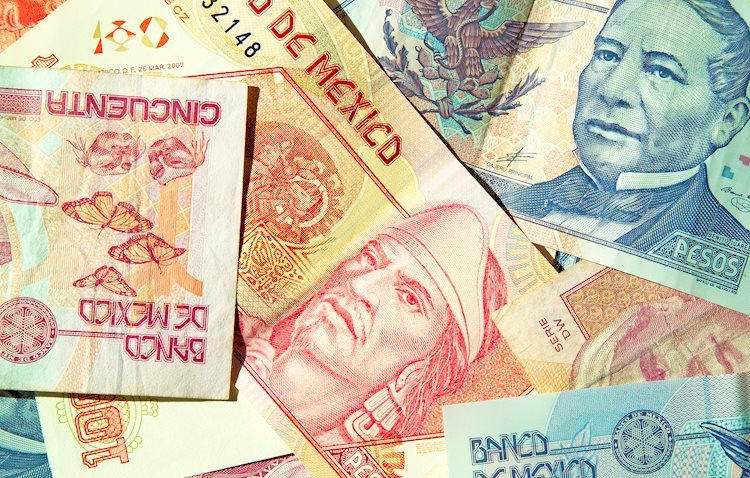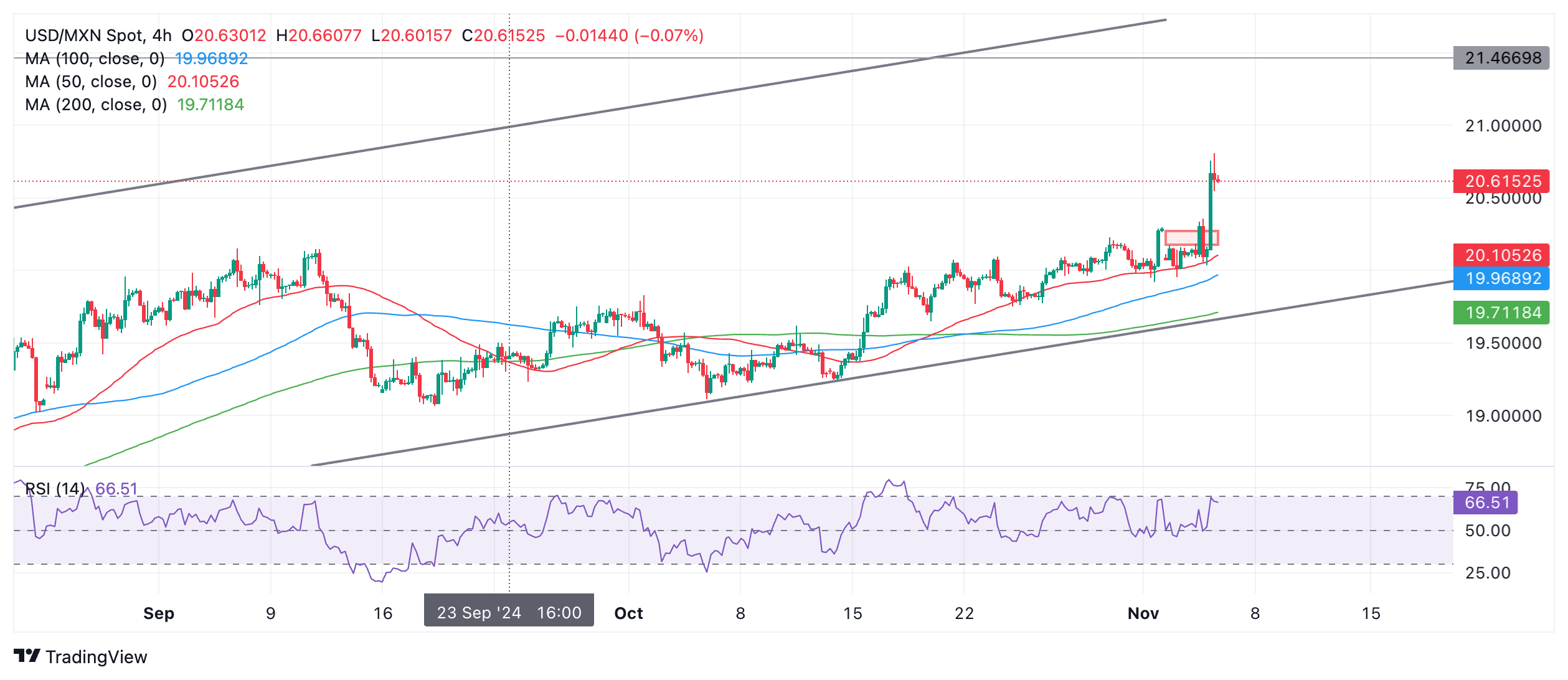- The Mexican Peso plunges several percentage points against its major pairs after Donald Trump secures 267 electoral votes, three away from victory.
- Trump’s threats of whacking huge tariffs on Mexican imports is wreaking havoc with the Peso.
- USD/MXN closes an open chart gap and extends its established uptrend within a rising channel.
The Mexican Peso (MXN) plummets in its most-heavily traded pairs on Wednesday, especially versus the US Dollar (USD), against which it is down almost three percent after it was announced Republican nominee Donald Trump has been voted the next President of the United States (US).
The Peso’s massive drop against the USD is due to Trump’s threat to place punitive tariffs on Mexican imports as well as the overall uplift to USD from his Dollar-positive economic policies.
Trump’s victory was part of a clean sweep for the Republicans who also won a majority of 42/51 in the US Senate and of 179/197 in the US Congress. Trump’s won the presidential race with 277 electoral votes over Kamala Harris’ 224.
Mexican Peso: Further upside could be down to who wins Congress
The Mexican Peso is currently trading in the 20.60s to the US Dollar, however, it may experience further weakness due to the Republican majority in Congress, according to Mexican financial news website El Financiero.
If Trump wins with a Republican majority in Congress, the Peso is likely to fall to between 21.14 and 22.26 against the US Dollar, said the website in a multi-scenario article prior to election day.
Mexican Peso also rattled by domestic woes
The Mexican Peso faces further negative pressure after the Mexican Supreme Court rejected proposals to alter a controversial new law allowing the election of judges by popular vote on Tuesday, according to El Financiero.
The Mexican Supreme Court decided to reject the arguments of one of its own judges, Juan Luis González Alcántara, that the reform was partially unconstitutional because aspects of the new law undermines the independence of the judiciary.
Instead, Alcántara, a known critic of the reforms, had proposed a modification to the law, only allowing the election of Supreme Court judges not all judges, which include thousands of lower court justices as well.
Critics argue the reform could increase concerns among foreign investors regarding the rule of law in Mexico and reduce inbound investment.
Technical Analysis: USD/MXN closes gap and surges higher
USD/MXN shoots higher and closes the gap opened on Monday (red-shaded rectangle on the chart below).
USD/MXN 4-hour Chart
USD/MXN is in an overall uptrend on a short, medium and long-term basis. Further, it is trading in a bullish rising channel. Given the technical dictum “the trend is your friend,” the odds, therefore, favor a continuation higher.
The Relative Strength Index (RSI) remains just below the overbought level of 70, suggesting there is still scope for further upside.
A break above the 20.80 high would probably confirm more gains, with 21.00 coming into view as the next key target and resistance level (round number, psychological support).
Mexican Peso FAQs
The Mexican Peso (MXN) is the most traded currency among its Latin American peers. Its value is broadly determined by the performance of the Mexican economy, the country’s central bank’s policy, the amount of foreign investment in the country and even the levels of remittances sent by Mexicans who live abroad, particularly in the United States. Geopolitical trends can also move MXN: for example, the process of nearshoring – or the decision by some firms to relocate manufacturing capacity and supply chains closer to their home countries – is also seen as a catalyst for the Mexican currency as the country is considered a key manufacturing hub in the American continent. Another catalyst for MXN is Oil prices as Mexico is a key exporter of the commodity.
The main objective of Mexico’s central bank, also known as Banxico, is to maintain inflation at low and stable levels (at or close to its target of 3%, the midpoint in a tolerance band of between 2% and 4%). To this end, the bank sets an appropriate level of interest rates. When inflation is too high, Banxico will attempt to tame it by raising interest rates, making it more expensive for households and businesses to borrow money, thus cooling demand and the overall economy. Higher interest rates are generally positive for the Mexican Peso (MXN) as they lead to higher yields, making the country a more attractive place for investors. On the contrary, lower interest rates tend to weaken MXN.
Macroeconomic data releases are key to assess the state of the economy and can have an impact on the Mexican Peso (MXN) valuation. A strong Mexican economy, based on high economic growth, low unemployment and high confidence is good for MXN. Not only does it attract more foreign investment but it may encourage the Bank of Mexico (Banxico) to increase interest rates, particularly if this strength comes together with elevated inflation. However, if economic data is weak, MXN is likely to depreciate.
As an emerging-market currency, the Mexican Peso (MXN) tends to strive during risk-on periods, or when investors perceive that broader market risks are low and thus are eager to engage with investments that carry a higher risk. Conversely, MXN tends to weaken at times of market turbulence or economic uncertainty as investors tend to sell higher-risk assets and flee to the more-stable safe havens.

